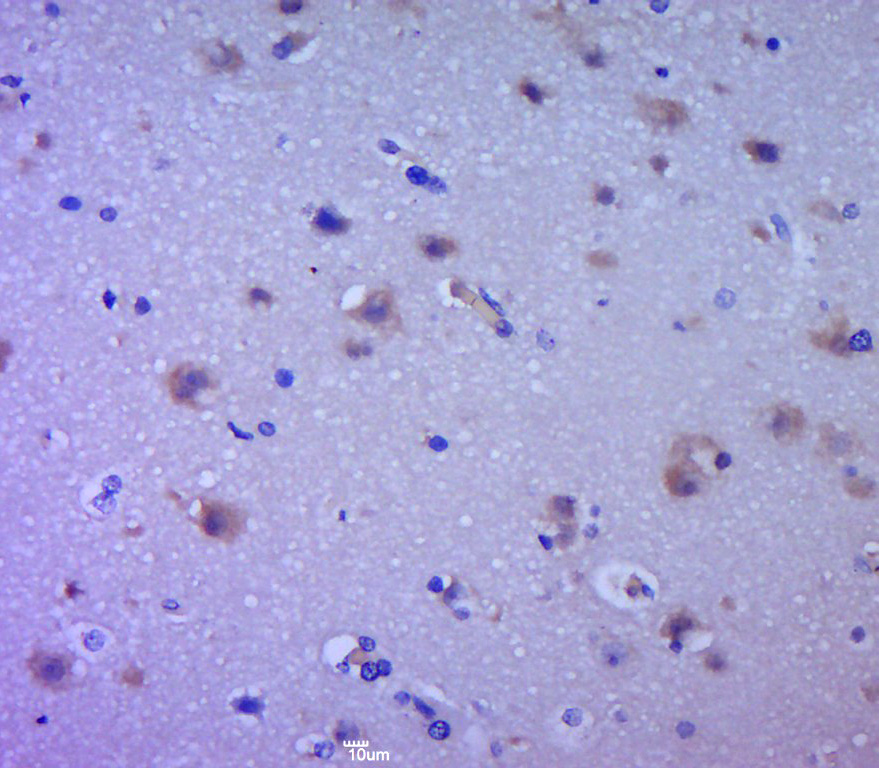Anti-EGFRvIII [806]
AB03036-10.3-BT
ApplicationsFlow Cytometry, ImmunoPrecipitation, ImmunoHistoChemistry
Product group Antibodies
ReactivityHuman
TargetEGFR
Overview
- SupplierAbsolute Antibody
- Product NameAnti-EGFRvIII [806]
- Delivery Days Customer9
- Application Supplier NoteThis antibody binds the U87 MG glioma cell line transfected with the de2-7 EGFR but not the parental U87 MG cell line, which expresses the wt. EGFR without gene amplification in a flow cytometric analysis. This antibody significantly inhibited the growth of U87 MG xenografts transfected with the de2-7 EGFR in a dose-dependent manner using both preventative and established tumor models. It also inhibited U87 MG cells transfected with the wild-type EGFR, which increased expression to ;106 EGFRs/cell and mimics the situation of gene amplification. Xenografts treated with this antibody all displayed large areas of necrosis that were absent in control tumors. This antibody was also reported to y inhibit the growth of new and established A431 xenografts, a cell line expressing >106 EGFRs/cell. This antibody was also used for the immunoprecipitation of de2-7 EGFR from U87 MG.D2-7 cells. This antibody was also used for the immunohistochemical analysis of frozen sections derived from U87 MG, U87 MG.D2-7, and U87 MG. wt. EGFR xenografts (PMID: 11454674). Chimeric version of this antibody displayed enhanced antibody-dependent cellular cytotoxicity against target cells expressing the de2-7 EGFR in the presence of human effector cells. In vivo therapy studies with chimeric 806 demonstrated significant antitumor effects on established de2-7 EGFR xenografts in BALB/c nude mice compared to control, and murine 806 (PMID: 15770208). This antibody is reported to be effective in blocking EGFRvIII signaling and inducing tumor cell apoptosis, resulting in tumor regression in the EGFRvIII-driven murine lung cancers in genetically engineered mice with lung tumors. This antibody shows promise in the treatment of the population of human non-small cell lung cancer (NSCLC) patients with these 2 classes of EGFR mutations (PMID: 17256054). This antibody in combination with EGFR tyrosine kinase inhibitor AG1478 synergistically inhibits the growth of tumors overexpressing EGFR (PMID: 17092939). Humanized version of this antibody called ABT-806 binds the mutant EGFRvIII with high affinity, inhibits the growth of squamous cell carcinoma xenograft models expressing high levels of wild-type EGFR. It was also reported that ABT-806 may have antitumor activity superior to cetuximab in EGFRvIII expressing tumors and similar activity to cetuximab in tumors highly overexpressing wild-type EGFR with reduced toxicity (PMID: 25731184).
- ApplicationsFlow Cytometry, ImmunoPrecipitation, ImmunoHistoChemistry
- CertificationResearch Use Only
- ClonalityMonoclonal
- Clone ID806
- Gene ID1956
- Target nameEGFR
- Target descriptionepidermal growth factor receptor
- Target synonymsERBB, ERBB1, ERRP, HER1, NISBD2, NNCIS, PIG61, mENA, epidermal growth factor receptor, EGFR vIII, avian erythroblastic leukemia viral (v-erb-b) oncogene homolog, cell growth inhibiting protein 40, cell proliferation-inducing protein 61, epidermal growth factor receptor tyrosine kinase domain, erb-b2 receptor tyrosine kinase 1, proto-oncogene c-ErbB-1, receptor tyrosine-protein kinase erbB-1
- HostHuman
- IsotypeIgG1
- Protein IDP00533
- Protein NameEpidermal growth factor receptor
- Scientific DescriptionThis chimeric human antibody was made using the variable domain sequences of the original Mouse IgG2b format for improved compatibility with existing reagents assays and techniques.
- ReactivityHuman
- Storage Instruction-20°C,2°C to 8°C
- UNSPSC41116161









